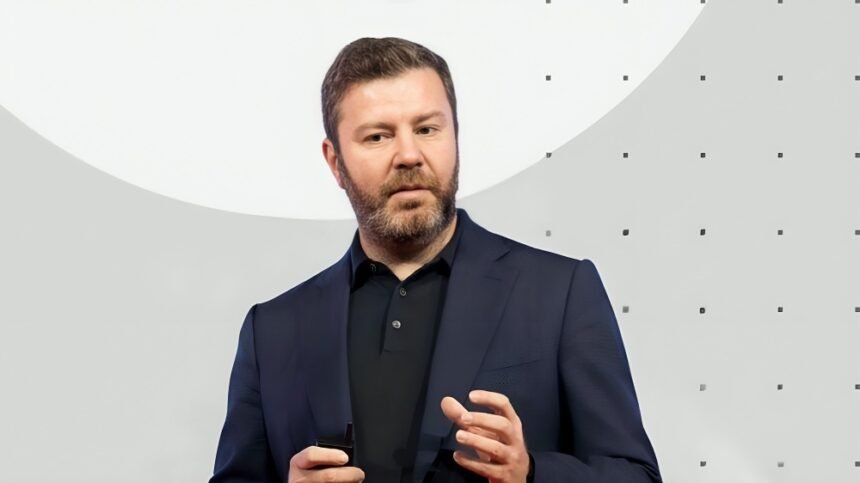Daniel Dines, The CEO of UiPath, is a software entrepreneur whose quietly relentless drive transformed a Bucharest startup into a global automation powerhouse. He co-founded the business that became UiPath and steered it through rapid growth, a public debut and a strategic pivot toward AI-powered enterprise automation.
From coder to company leader
Dines began his career as a programmer in Romania and spent several years at Microsoft in the early 2000s before returning home to build DeskOver in 2005, a services and automation library company that later evolved into UiPath in the mid-2010s. His technical roots and pragmatic leadership shaped the company’s emphasis on practical tools that automate repetitive office work the foundation of UiPath’s platform.
Building UiPath into a global brand
The CEO of UiPath guided the company through rounds of venture funding, aggressive international expansion and a high-profile initial public offering in April 2021 under the ticker PATH on the New York Stock Exchange. UiPath’s rise made Dines one of Romania’s best-known entrepreneurs and helped popularize Robotic Process Automation across industries from finance to healthcare.
A leadership style rooted in engineering
The CEO of UiPath brings an engineering-first mindset to executive decisions. Colleagues describe him as direct, analytical and intensely focused on long-term product-market fit. Under his watch, UiPath prioritized developer-friendly tooling, an ecosystem strategy to encourage partners and a customer-first orientation that emphasized measurable ROI on automation projects.
The comeback and strategic pivot
After experimenting with a co-CEO model and senior role shifts, the company announced he would reassume the top executive role in mid-2024 to steady the ship amid market challenges. Since returning, the CEO of UiPath has driven a strategic pivot toward combining deterministic automation with generative and agentic AI capabilities effectively positioning UiPath as an orchestrator of bots, agents and human workflows.
What sets UiPath apart
At its core, UiPath’s product philosophy has stressed scaling automation across large organizations and reducing the friction of deployment. The company’s platform enables teams to automate routine tasks, integrate with legacy systems and measure impact a pragmatic playbook that helped UiPath achieve rapid adoption in the enterprise. This practical bent has kept the company closely tied to measurable business outcomes rather than experimental AI hype.
Recognition, values and giving back
Beyond business milestones, the CEO of UiPath has drawn recognition for his role in creating one of Romania’s most successful tech companies. Media outlets have dubbed him a leading voice in automation, and he has been noted for philanthropic gestures that underscore a broader interest in cultural causes and responsible technology.
Challenges and market realities
He has acknowledged the trade-offs that come with moving beyond traditional RPA into AI-infused systems. Concerns about cost, governance and accuracy especially when integrating non-deterministic models require careful product design and enterprise-grade controls. UiPath has invested in an “AI Trust Layer” and tooling that allow customers to retain deterministic processes where precision is essential, while leveraging AI where flexibility and reasoning add value.
A public company’s pressures
Managing investor expectations after a public listing has demanded a different cadence than running a high-growth private startup. UiPath’s leadership balanced investments in long-term platform work with near-term profitability targets, executing cost controls and prioritizing investments that drive customer value. It’s a tension that shapes how The CEO of UiPath spends his time today equal parts product, culture and capital allocation.
Legacy and the next chapter
Beyond product metrics and revenue, he has become a symbol of the Romanian tech diaspora’s ability to build global winners. He has spoken about the moral and social dimensions of automation how companies should design systems that augment human work rather than simply replace it. As UiPath moves toward more advanced AI orchestration, its ability to demonstrate improved productivity and ethical governance will likely define the next chapter of his leadership.
Lessons from his journey
There are clear lessons in Dines’s arc the importance of deep technical expertise in leadership, the value of starting with measurable customer problems, and the need to evolve quickly when market conditions change. For entrepreneurs and executives, the CEO of UiPath offers a case study in scaling engineering-led culture into global impact.
Looking forward
UiPath under Dines will likely continue to push at the intersection of automation and AI, with an emphasis on enterprise trust, governance and tangible ROI. The company has pursued targeted additions to its product stack and made strategic moves to strengthen vertical AI capabilities steps that reflect a broader ambition to make its platform indispensable to large enterprises. As organizations evaluate Robotic Process Automation and broader AI investments, UiPath’s focus on orchestrating people, bots and AI agents backed by targeted acquisitions and partnerships positions it to be a central player in the modernization of knowledge work.
The human behind the title
He keeps a low public profile compared with many Silicon Valley founders, preferring to let products and customer outcomes do the talking. Yet his story from modest beginnings in Romania to leading a global software company listed in New York is a reminder that technical curiosity paired with stubborn execution can reshape entire industries.
What to watch
Investors and customers will closely track product adoption, gross margins and UiPath’s ability to govern AI at enterprise scale. Ultimately, the CEO of UiPath will be judged on execution turning ambitious AI promises into reliable, everyday business outcomes.




